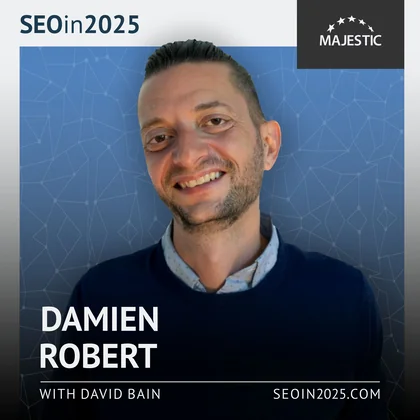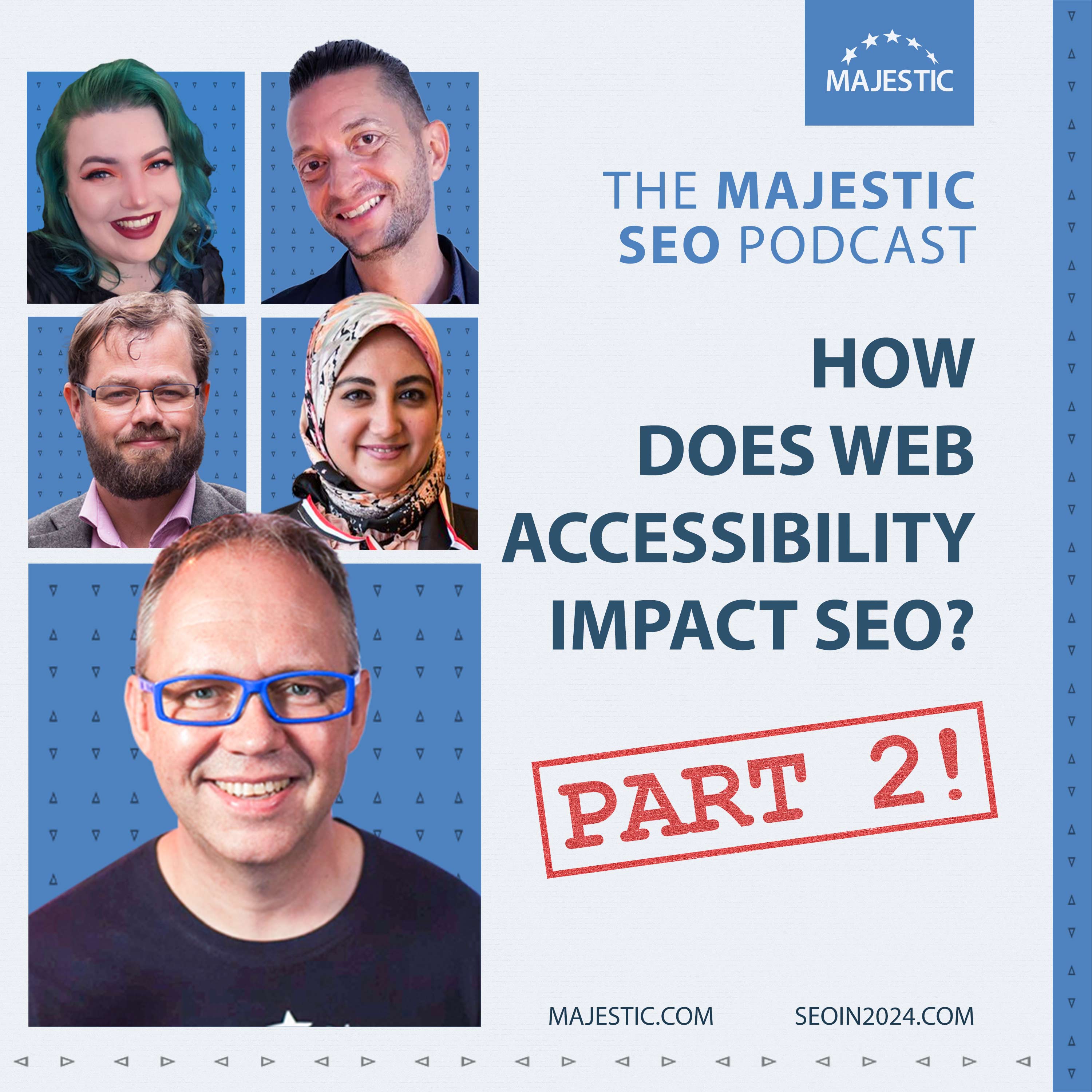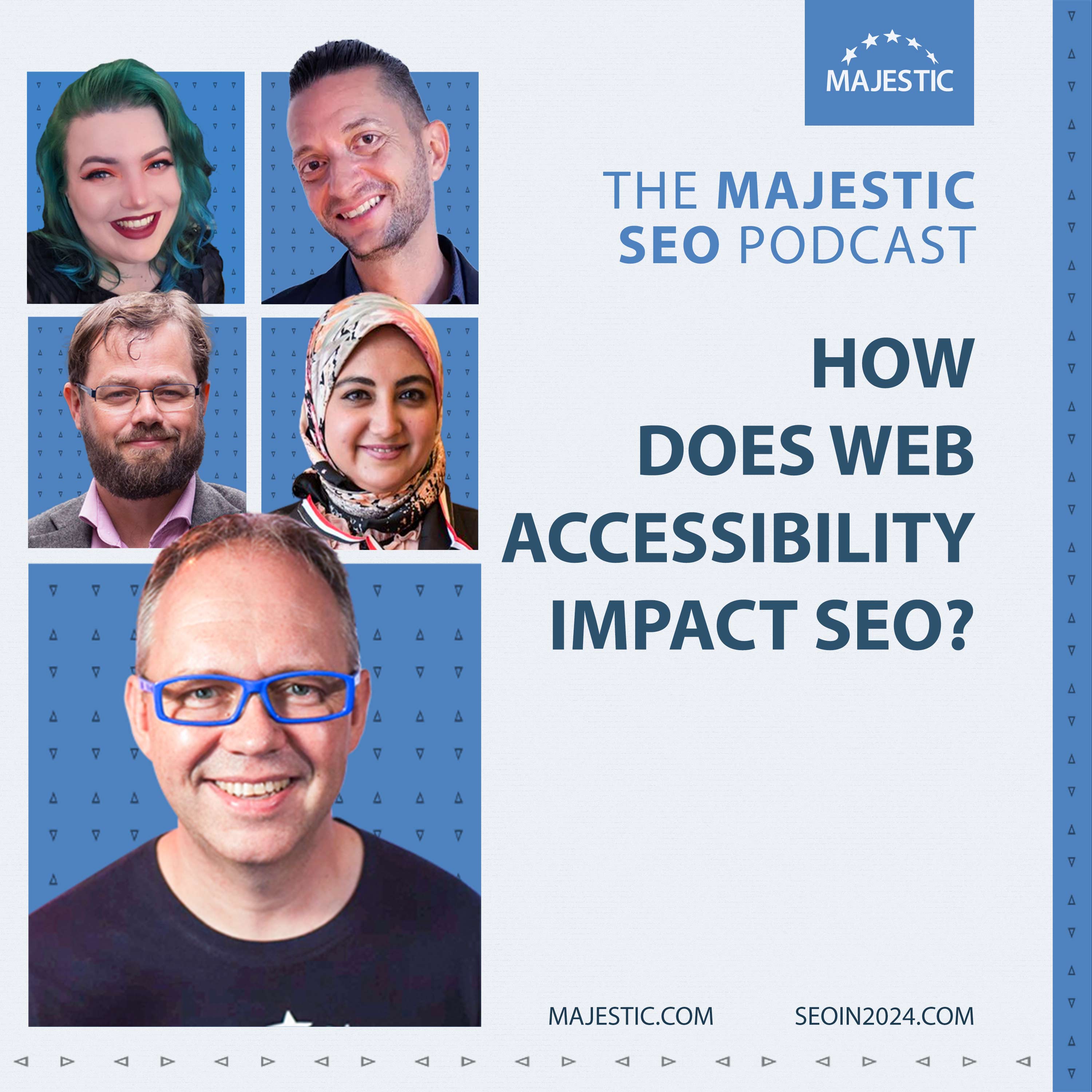-
Site Explorer
- Majestic
- Summary
- Ref Domains
- Backlinks
 New
New Lost
Lost- Context
- Anchor Text
- Pages
- Topics
- Link Graph
- Related Sites
- Advanced Tools
- Author ExplorerBeta
- Summary
- Similar Profiles
- Profile Backlinks
- Attributions
- Compare
-
Link Tools
- My Majestic
- Recent Activity
- Reports
- Campaigns
- Verified Domains
- OpenApps
- API Keys
- Keywords
- Keyword Generator
- Keyword Checker
- Search Explorer
- Link Tools
- Bulk Backlinks
- Neighbourhood Checker
- Submit URLs
- Experimental
- Index Merger
- Link Profile Fight
- Mutual Links
- Solo Links
- PDF Report
- Typo Domain
- Free SEO Tools
- Support
Embrace search experience optimisation
Damien Robert
It’s easy to lose sight of your users when you’re doing battle with search engines, but Damien Robert from Convatec believes that crafting a truly accessible experience should be a cornerstone, not an afterthought.

Embrace search experience optimisation
Damien says: “Embrace search experience optimization, more than search engine optimization, through the lens of web accessibility and a simplified web state.”
Is search experience optimization a combination of search marketing and web accessibility?
“Yes. My advice is that you should really focus on web accessibility and take it as a cornerstone of a better search experience.
When we talk about search experience optimization rather than search engine optimization, we’re putting the user first, which is not a new story. However, we’re really looking at the entire search experience of the user from the beginning of the query search to conversion, and sometimes even up to brand loyalty.”
Have search marketing and web accessibility only recently become linked?
“They have always been linked. SEO was born from web accessibility, not the other way around. Everything that we’re doing in the SEO field, every SEO ranking factor we talk about, was first designed for web accessibility.
We’re talking about optimizing for a search engine, which is an emulation of a deafblind entity. That’s why web accessibility has always been at the core of SEO, but it’s been forgotten about and put aside for lots of different reasons. People think it is too complicated or that it is optional and only targets a small percentage of the population.
In 2025, it is going to become a hot topic because of the European Accessibility Act that comes into force at the end of June. People are going to feel forced to embrace web accessibility when, actually, it can be the cornerstone of your SEO strategy.”
Is there a difference between web inclusivity and web accessibility?
“I wouldn’t say so. They are strongly related. W3C, for example, puts accessibility, usability, and inclusion in the same package. They’re all interlinked, and they mean almost the same thing.
If you improve your web accessibility (which is probably the more technical term), you will become more inclusive – in terms of your SEO as well. We are talking about SEO inclusivity these days too.”
How do you create an experience that makes everyone feel welcome?
“You give options to people. Think about how you can make the same content digestible in different ways. Rather than multiplying the topics and spending lots of time doing that, take a piece of content and make a video or audio file out of it, or make infographics. Give options to people.
Another good option is to put the same content in a simplified way, for readability. Make sure that you include everyone and don’t focus too much on certain disabilities. Try to be as universal as possible.
I always take the example of the curb cut effect, where disability-friendly features are useful to more people than just those with the specific disabilities they were designed for. When something works for people with disabilities, you have the best chance that it’s going to work for everyone else.
Automatic doors are a great example. No one questions them anymore because they are useful for everybody, without exception. The electronic toothbrush was also originally designed for people with disability needs.
Let’s transfer that way of thinking to the web and try to implement universal design. Giving options to people can make all your users feel welcome. Focus on the welcoming aspect more than the discoverable aspect that we have focused so much on in the past.”
Does technology make the experience more equal already, by doing things like reading text content to people who prefer to consume it that way?
“It does, and it is evolving a lot, but technology doesn’t work on its own. If you don’t work on your foundation and show it the path, this is not going to work. I use assistive technology to check my websites almost every day. Assistive technology (such as a screen reader) works really well but, if you don’t work on your foundation, it will skip large parts of your content or otherwise provide a terrible experience of it.
That’s why manual testing is really important for web accessibility, to make sure that your content is actually accessible. Technology evolves, but it is never going to work without the basic foundations of a good website.
For example, you need to ensure that screen readers read the content in the correct order. It might look nice on the screen, but the way that the code is produced could mean that the screen reader takes it in a completely unintended order.
The good news is, if you work on web accessibility criteria, you’re going to work on your SEO too. Who doesn’t like a good heading structure? That is so important for assistive technology such as screen readers and voice recognition software.
You can also think about colour contrast, for example. Whether people use assistive technology or not can depend on their environment. If you are in a dark environment, you will be very happy that people have thought about the colour contrast for web accessibility. If you have forgotten your glasses all day and you go to work, you’re going to be very happy about good colour contrast on the website too.”
Is it only SEOs and UX designers that need to be aware of this or is it important for many different marketing channels, like paid search?
“For me, search experience optimization is finally reconciling PPC and SEO. It’s always been very difficult for the two streams to work together. In big global corporations, they are often at odds with each other. Sometimes they’re even working in different departments, with one in IT and the other in marketing.
If you think in terms of search experience optimization, you’re going to think about paid search and SEO at the same time – and wider marketing too, like brand creation. You need to go back to manual testing, go on Google with a screen reader, and see what you see.
For big corporations, I’ve seen the contradictory message where both paid search and SEO are brought up on the same SERP. That’s not rare. It happens everywhere because these teams don’t communicate. If you put someone who is looking after the search experience overseeing all the different departments, then they could make people talk.
If you have a search experience lead, manager, or director, that will make a major difference. You’re going to unravel quick bugs to fix, contradictory messaging, and so forth.”
What are some key aspects of web accessibility that big brands often get wrong?
“Colour contrast, first and foremost. Even the branding is often not accessible for big brands. More than 90% of homepages on the top 1 million websites have errors in colour contrast. That’s the number 1 issue.
If you look after your colour contrast, it’s going to go through your branding and your messaging, and it’s going to unravel a lot more.”
How do you measure the impact of introducing better web accessibility?
“It’s not really different than how you otherwise measure with SEO. You’re going to measure user engagement as it improves. If you focus on web accessibility, your user engagement should improve. It should remove barriers for lots of people – and not only people with disabilities.
This is a universal strategy more than a targeted strategy that’s focused on a specific group of people. You will see the benefits of that in your user engagement, and potentially on brand searches too because the cohesion of your brand is going to be better.
For years, we have been saying that we are doing more than SEO when we do SEO. We’re interested in the brand message and the brand promise. Search experience optimization is a bit more overarching than just search engine optimization. Finally, people might feel they have found their place and try to use wider measurements to see the impact of their work.”
Can you put a financial value on improving user experience?
“You can put a different kind of financial value on it. If we talk about web accessibility and the European Accessibility Act, we’re talking about compliance. The direct financial value is avoiding a fine. We’re talking mainly about e-commerce websites and online banking here, but I believe this is only the first step.
There is a real shift happening in accessibility understanding in the virtual world that we’re going to see more and more of. I think this will be the first in a series of new laws – or enforced laws. In the UK, for example, we have the Equality Act, but it hasn’t been taken seriously enough because corporations haven’t been fined by this legislation. Now that the EU is starting to do that, other countries are going to follow for the benefit of all. This is not punitive, but it is a way of trying to make that shift happen in the web world.
Sometimes the stick is necessary, and it can be more powerful than the carrot. Sometimes we need a little bit of everything, and legislation is working really well in the accessibility world because it’s been overlooked for lots of different reasons – and sometimes unfairly. This is a way to start the work, and to start finding it interesting too.”
If an SEO is struggling for time, what should they stop doing right now so they can spend more time doing what you suggest in 2025?
“Stop going everywhere with your content. Maybe stop creating new content altogether. Think about the pieces of content you already have. If it’s well written, how can it be accessible to all and drive more people there? Build an increasingly flawless experience for the user rather than creating more and more.
I’m really into the consolidation of your web estate. Stop creating for a year, and just optimize the experience for all users. It’s going to take you the whole year to do that. You’re not going to get bored, but it’s going to get really interesting – not only for the people working on that, but also for the users. Stop the creativity aspect and try to provide access for all.”
Damien Robert is Search Marketing and Web Accessibility Manager at Convatec, and you can find him over at Damien-Robert.com.
Also with Damien Robert
Choose Your Own Learning Style
 Video
Video
If you like to get up-close with your favourite SEO experts, these one-to-one interviews might just be for you.
Watch all of our episodes, FREE, on our dedicated SEO in 2025 playlist.
 Podcast
Podcast
Maybe you are more of a listener than a watcher, or prefer to learn while you commute.
SEO in 2025 is available now via all the usual podcast platforms
Don't miss out
Opt-in to receive email updates.
It's the fastest way to find out more about SEO in 2025.
Could we improve this page for you? Please tell us







